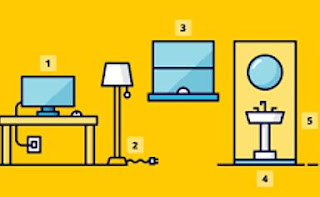7 Actionable Electrical Safety Tips During Storms
Unpredictable weather such as storms and flood are a part of life. Therefore, it is important to take the time to prepare your family and property.
There are a number of simple steps you can take to protect personal safety, preserve electrical equipment and deal with potential damage to the home's electrical system. Make sure you are electrically safe by following these 7 tips:
1. Put safety first
Don't attempt do-it-yourself repairs if your property suffers storm damage, including your home's electrical system and any electrical appliances affected. Be ready before a storm or wet season.
- Install a safety switch and test it regularly.
- Know where to turn off your power, gas and water supply in an emergency.
- Pack up electrical equipment that's not in use and store in a safe place.
2. Protect the system
Ask an electrician with experience in domestic electrical services about having lightning protection installed in your switchboard to protect all appliances.
3. Unplug before the storm
Unplug outside TVs and non-fixed aerials and store in a dry area.
When a storm approaches switch off and unplug sensitive appliances or equipment.
Shut down your solar PV system using the safe isolation procedure.
4. Don't connect during the storm
Don't use equipment directly connected to electricity, including the stove, during a storm.
If you've lost power, turn off your power points and unplug electrical equipment.
Don't use a fixed telephone during a thunderstorm - it can deliver an electric shock.
If flood waters are expected, shift electrical equipment to higher locations.
5. Be cautious of wires
Don't go outside to check the damage before an electrician arrives, especially during a storm, as fallen power lines are easily concealed and can be deadly.
If you are in a car, stay away from power lines, trees and watercourses. Stay in your vehicle.
If you have a solar PV system that has been damaged in a flood, storm or cyclone you need to have an electrical contractor inspect the system and check it is safe.
Check your electrical appliances and equipment. Using water-damaged equipment can result in electric shocks and fires.
6. Call an electrician before your energy distributor
If the wires have been torn down in a black out, most houses will require internal repairs before the power can be reconnected.
Dispose of or have a licensed electrical contractor repair water-affected household electrical items, such as kettles, toasters and televisions.
Call a licensed electrician to check all hard-wired electrical appliances, such as air-conditioning units or stoves, intended for re-use. This safety check may be required before the power supply can be reconnected.
7. Be confident in your contractor
If you suffer storm damage connect with a local electrician. If you are using power from generators, it can be dangerous if incorrectly managed.
Connect your generator to your house electrical wiring using a generator change-over switch and appropriate socket. These switches must be installed by a licensed electrical contractor.
Do not connect your generator to your house using a power point on a power circuit or any other connection point. This can cause dangerous 'back-feeding'.
During storm seasons, it is definitely worth being extra cautious with your home electrical systems and equipment. The practical stops you take could reduce the risk of electrical fires and safeguard your family from any potential hazards.

Comments
Post a Comment